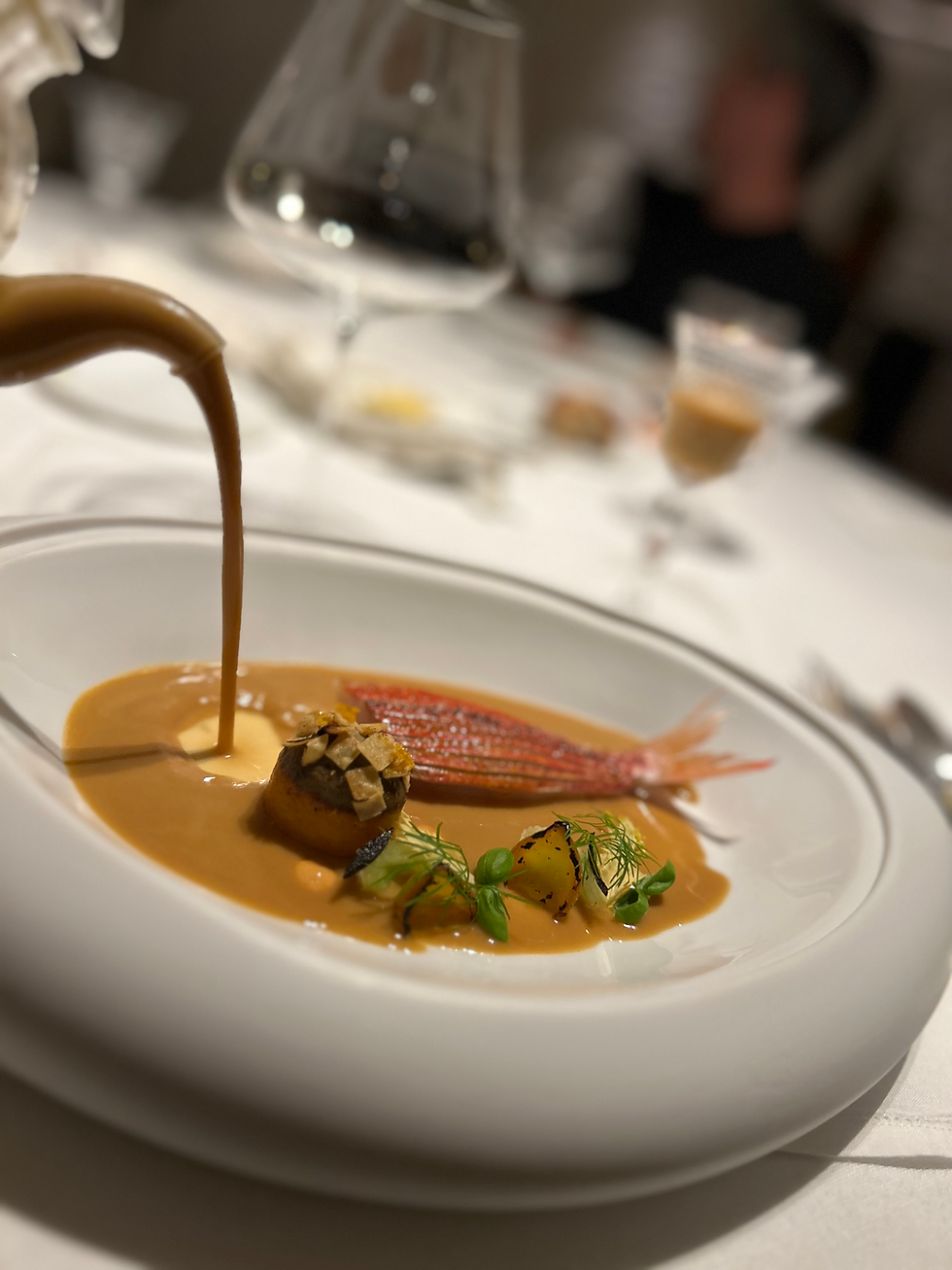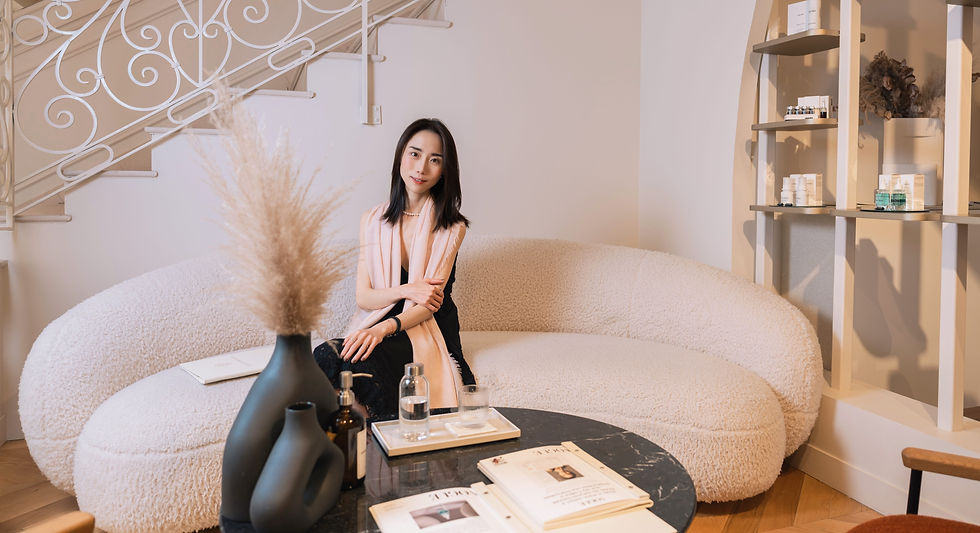WSET Level 4 winner Shen Chen Puffy: Wine allows me to meet interesting people with stories
- puffy0825
- Oct 18, 2023
- 5 min read
Hello everyone, I am Shen Chen. Everyone calls me Puffy. I am from Beijing. As the name suggests, I have a warm personality and like to meet interesting people through wine. Currently running my own studio "Puffy's Atelier" in Paris, which mainly provides Chinese-speaking friends with a better travel experience in Paris (high-end travel planning studio). Especially wine-related customization, such as restaurants with good wine lists, hotels with good wine and food, Bar à Vin with high-quality services, interesting wine cellar experiences, etc.

I majored in foreign languages at university, and then studied hotel management at Glion in Switzerland (one of the three major hotel management schools in the world). I fell in love with the F&B course. Wine (the school’s wine teacher was Paolo Basso, the world sommelier champion), so he later studied in Niagara College, Canada, majoring in winemaking and obtained the Canadian Association of professional sommelier diploma (CAPS: Canadian Association of professional sommelier).

When I was young, my grandfather worked in the Ministry of Foreign Affairs. For many years in Germany, my grandfather always had some sweet Riesling at home. During family gatherings during holidays, I would always " I secretly tasted wine and found it to be much better than the Fenjiu that my grandma liked... After I grew up and studied abroad, the light and dense texture of the champagne served at Glion restaurant made me fall in love with wine, so I signed up for the WSET course and fell in love with it "systematically" Had wine. Later, because I wanted to improve my professional knowledge, I signed up for a winemaking course and a sommelier course (UC Davis, my first choice, was already full that year).

After I moved to London from Hong Kong, I always wanted to do something challenging. The London headquarters has the best teacher resources, and you can be classmates with the most “crazy” wine lovers from all over the world. Why should you refuse? So I came up with the idea of applying for CET-4. I started studying unit 1 in September 2018, and got the certificate the day before giving birth to my baby in March 2020. Moreover, I was a wine journalist in China before.Professional advantagesIt gives me some good winery visit resources, which is very effective for systematic learning of professional knowledge.

In the process of preparing for the CET-4 examI had the thought of giving up strong>, because I was preparing for the exam during my pregnancy, and I was more pregnant in the early stages of my pregnancy, but my husband encouraged me and told me not to be stressed, but to take study as a " Distraction” point kept me going. Let’s talk about an episode during the review period: Pregnancy 6 When I was 1 month old, I took the Units test and tasted 12 wines blindly and I actually passed with Distinction. Maybe I drank less during pregnancy and my sense of smell and taste became more sensitive.

Maybe because at the London headquarters, my classmates come from all over the world: Russia, Sweden, Portugal, Spain, South Korea... Most of us are industry insiders, and there are also pure enthusiasts. When we discuss a wine with each other, we feel very emotional and develop ideas. We also use our own resources to make appointments with wineries in different production areas and drive to visit them together. Every time, we gain a lot. Taking the CET-4 test is actually based on interest, but For me, it is a blessing to be able to combine my interest and career. I really feel that interest is the best driving force.

Testing CET-4 has played a big role in my life. In addition to wine knowledge, it has also allowed me to constantly meet interesting people with stories through wine; it has also taught me to stand up for myself. If you persist, you will definitely gain something.
· Learning methodology ·
Except for the spirits unit, the subject I did best in the exam was sparkling wine; because I love champagne so much! In addition to theoretical knowledge, going to the production areas and observing the terroir also greatly strengthens my memory... I remember that I took the test in the London examination room that year and took three types of champagne: NV, Blanc de Blancs and vintage champagne. I opened it at home with a month of blind tasting preparation. The record of 100 bottles of champagne accurately identified all of them as champagne. After the test, everyone said it was impossible and there must be other production areas, but I firmly believed in my taste buds, and the facts proved that it was right. The first instinct of blind tasting is really important, and of course logical analysis also complements each other. During the exam, you must trust your intuition, write well and quickly, express your language concisely, and try to have as many typos as possible.

I completed the exam in 1 year and 2 months (I started studying in September 2018 and took the unit 3 exam in November 2019), which averages about 20-30 hours per week. For theoretical study, the time to go to production areas is relatively irregular, but I visited about 10 production areas throughout the school year: Burgundy, Champagne, Bordeaux, Jura, Alsace; Tuscany, Sicily; Port, Andaloo West Asia, as well as Valais in Switzerland, Baden in Germany, etc.
In the early days of review, I mainly relied on drinking my favorite wine to treat myself to relieve stress. Later, when I learned that I was pregnant, I could only drink champagne. In addition to class and daily review, I often Attending industry tasting events also helps me review, and luckily there are many such events in London.

· Advice to candidates ·
Many people impulsively sign up, investing money and time, but are in a dilemma if they can't persist. As someone who has experienced it, my suggestion is to think through the pros and cons in advance, and borrow a book from someone who has experienced it first. Although the tutorial is just an outline, I can’t read the outline, let alone the information book. Wine lovers who can’t read the book should not read it. It’s exam time, take your tuition and drink!

· Reader interaction ·
How to become a MW candidate?
I have no plans for the time being, so I didn’t do much research.
Will you continue to apply for the MW exam? What are your thoughts on the future of wine?
I have no plans for now because I just started my own studio. I hope to be on the road again one day. The learning process is always interesting, not to mention learning while drinking. Currently, I hope that my studio can help Chinese friends who come to Paris for vacation to explore some places where locals go and have good wine, whether it is a restaurant or a wine shop. Discover more wine cellars with quality assurance, excellent storage conditions, restaurants with cost-effective wines, etc...

What changes have occurred in your life after receiving the certificate? Is there any difference from what you expected before?
No changes and no gaps. Personally, I don’t think the WSET Level 4 Certificate can prove anything. If it can, it only proves self-discipline. There is no expectation of career advancement, so there is no sense of gap.
- END -




Comments